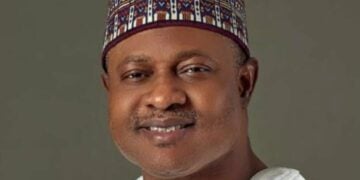Federal government and state governors have endorsed a new Renewed Hope Ward Development Programme, designed to channel the gains of recent economic reforms directly to Nigeria’s 8,809 wards, creating jobs, boosting food security, and reducing poverty.
Vice President Kashim Shettima unveiled the initiative at yesterday’s National Economic Council (NEC) meeting. It will target at least 1,000 economically active persons in every ward for direct support, simulating grassroots economic activity.
Briefing State House correspondents after the meeting, Minister of Budget and Economic Planning Atiku Bagudu said President Bola Tinubu attended the NEC session and commended governors for their cooperation, describing the programme as a “historic next step” in the administration’s reform agenda.
“Having stabilised the macro-economy, the next step is to drill development down to the lowest levels so that, in all 8,809 wards, we can stimulate economic activity that will generate employment, reduce poverty, enhance food security, and strengthen social protection,” Bagudu explained.
According to him, the programme will be jointly funded by federal, state, and local governments using increased Federation Account revenues and aligned with other development initiatives already in motion.
Bagudu stressed that the plan draws from Chapter Two of the Nigerian Constitution, which mandates all tiers of government to “harness the resources of the nation and promote a dynamic, self-reliant economy.”
‘A federation project’ The minister described the ward development push as “a Federation project” and said NEC had passed a resolution to make his ministry the secretariat for the programme.
He also referenced the latest IMF Article IV report on Nigeria, which praised Tinubu’s bold reforms — including fuel subsidy removal, foreign exchange market liberalisation, and stronger revenue administration — for improving economic stability and resilience.
“Mr President believes that to reduce poverty and food insecurity, we must invest collaboratively in the creative energy of Nigerians in every ward. Having achieved macroeconomic stability, this programme is the natural next step,” Bagudu said.
During his briefing, Imo State Governor Hope Uzodinma said the council unanimously supported the ward development scheme, describing it as a way to ensure reform gains reach the “common man on the street.”
“The country is earning more money now, and so are subnational governments,” Uzodinma noted. “The president brought a programme that will fast-track the process of this additional money making a bigger impact by trickling down to the grassroots. This is how Nigerians will begin to feel the Renewed Hope agenda at their level.”
Uzodinma revealed that NEC also discussed environmental impact assessments for major legacy projects such as the Lagos-Calabar Coastal Road and the Sokoto-Badagry Road. A committee will be set up to coordinate federal and state efforts to speed up these projects.
With NEC’s endorsement, the Renewed Hope Ward Development Programme is expected to bridge Tinubu’s macroeconomic reforms and tangible benefits for ordinary Nigerians. It will unlock small-scale economic opportunities and set the stage for the administration’s $1 trillion economy ambition.
“The reform policies are beginning to yield fruits,” Uzodinma added, “and now the focus is on ensuring those fruits are felt down to the grassroots.”
We’ve got the edge. Get real-time reports, breaking scoops, and exclusive angles delivered straight to your phone. Don’t settle for stale news. Join LEADERSHIP NEWS on WhatsApp for 24/7 updates →
Join Our WhatsApp Channel










